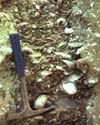| . |  |
. |
London, UK (SPX) Apr 17, 2006 Scientists have found that organic nitrogen is more important for plant growth than previously thought and could contribute to maintaining diversity in grasslands. Until recently it was generally believed that the most important source of nitrogen for plants was inorganic nitrogen. However, researchers funded by the Biotechnology and Biological Sciences Research Council (BBSRC) from the University of Lancaster and the Institute of Grassland and Environmental Research (IGER) have found that not only can organic nitrogen be directly taken up by plants it is also used differently by different species, enabling nitrogen sharing and biodiversity. By tagging organic nitrogen with stable isotopes researchers have challenged the long held idea that organic nitrogen has to be first converted into an inorganic form before the plants can use it. Their findings have significant implications in unfertilised, low-productivity grasslands where organic nitrogen often appears in greater concentrations than inorganic forms. Professor Richard Bardgett, lead researcher at the University of Lancaster explained: "This research provides important new information about what happens to organic nitrogen in real ecosystems in real time. Tagging amino acids also revealed that different plant species prefer different sources of organic nitrogen. These preferences may be a way for plants and microbes to avoid competition with their neighbours for nitrogen when it is in very short supply, effectively enabling them to share nitrogen and maintain biodiversity." Professor Julia Goodfellow, BBSRC Chief Executive, commented: "This is important work which increases our understanding about the underlying processors that generate and maintain biodiversity and will help farmers, industry and government make the most of natural resources and use biodiversity more effectively." Related Links Biotechnology and Biological Sciences Research Council  Chicag0 IL (SPX) Apr 17, 2006
Chicag0 IL (SPX) Apr 17, 2006The best way to avoid becoming a fossil is to be small and live in deep, tropical waters. So say four paleontologists who have published a detailed, global study of clam preservation. Their work is intended to enhance evolutionary studies by determining what's missing from the fossil record and why. |
|
| The content herein, unless otherwise known to be public domain, are Copyright 1995-2006 - SpaceDaily.AFP and UPI Wire Stories are copyright Agence France-Presse and United Press International. ESA PortalReports are copyright European Space Agency. All NASA sourced material is public domain. Additionalcopyrights may apply in whole or part to other bona fide parties. Advertising does not imply endorsement,agreement or approval of any opinions, statements or information provided by SpaceDaily on any Web page published or hosted by SpaceDaily. Privacy Statement |